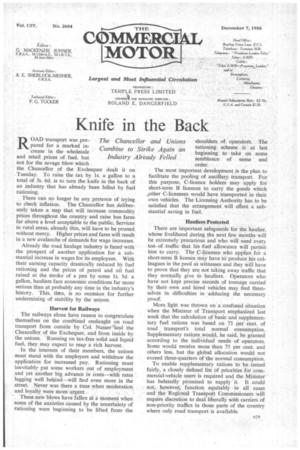Knife in the Back
Page 37

If you've noticed an error in this article please click here to report it so we can fix it.
ROAD transport was prepared for a marked in crease in the wholesale and retail prices of fuel, but not for the savage blow which the Chancellor of the Exchequer dealt it on Tuesday. To raise the tax by Is. a gallon to a total of 3s. 6d. is to turn the knife in the back of an industry that has already been felled by fuel rationing.
There can no longer be any pretence of trying to check inflation. The Chancellor has deliberately taken a step that will increase commodity prices throughout the country and raise bus fares far above a level acceptable to the public. Services in rural areas, already thin, will have to be pruned. without mercy. Higher prices and fares will result in a new avalanche of demands for wage increases.
Already the road haulage industry is faced with the prospect of another application for a substantial increase in wages for its employees. With their earning capacity drastically reduced by fuel rationing and the prices of petrol and oil fuel raised at the stroke of a pen by some Is. 5d. a gallon, hauliers face economic conditions far more serious than at probably any time in the industry's history. This, then, is no occasion for further undermining of stability by the unions.
Harvest for Railways The railways alone have reason to congratulate themselves on the combined onslaught on road transport from outside by Col. Nasser *and the Chancellor of the Exchequer, and from inside by the unions. Running on tax-free solid and liquid fuel, they may expect to reap a rich harvest.
In the interests of their members, the unions must stand with the employers and withdraw the application for increased pay. Rationing must inevitably put some workers out of employment and yet another big advance in costs—with rates lagging well behind—will find even more in the street. Never was there a time when moderation, and loyalty were more urgent. , These new blows have fallen at a moment when some of the anxieties caused by the uncertainty of rationing were beginning to be lifted from the shoulders of operators. The rationing scheme is at last beginning to take on some semblance of sense and order.
The most important development is the plan to facilitate the pooling of ancillary transport. For this purpose, C-licence holders may apply for short-term B licences to carry the goods which pther C-licensees would have transported in their own vehicles. The Licensing Authority has to be satisfied that the arrangement will effect a substantial saving in fuel.
Hauliers Protected There are important safeguards for the haulier, whose livelihood during the next few months will be extremely precarious and who will need every ton of traffic that his .fuel allowance will permit him to carry. The C-licensee who applies fo'r a short-term B licence may have to produce his colleagues in the pool as witnesses and they will have to prove that they are not taking away traffic that they normally give to hauliers. Operators who have not kept precise records of tonnage carried by their own and hired vehicles may find themselves in difficulties in adducing the necessary proof.
More light was thrown on a confused situation when the Minister of Transport emphasized last week that the calculation of basic and supplementary fuel rations was based on 75 per cent. of road transport's total normal consumption. Supplementary rations would. he said, be granted according to the individual needs of operators. Some would receive more than 75 per cent. and others less, but the global allocation would not exceed three-quarters of the normal consumption.
To enable supplementary rations to be issued fairly, a closely defined list of priorities for commercial-vehicle users is required and the Minister has belatedly promised to supply it. It could not, however, function equitably in all cases and the Regional Transport Commissioners will require discretion to deal liberally with carriers of non-priority traffics in those parts of the country where only road transport is available.




























































































































